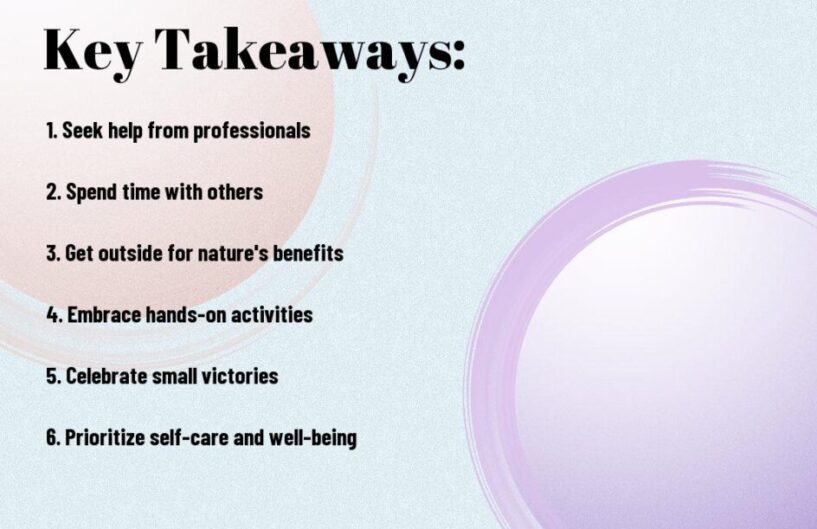Table of Contents
Caring for your mental health is a vital part of your overall well-being, impacting not just how you feel, but also your thoughts and actions. As you navigate life’s challenges, it’s crucial to prioritize your mental wellness, recognizing that it’s a journey that requires attention and effort at every stage.
By incorporating simple yet powerful practices into your daily routine, you can take significant strides towards a more balanced and fulfilling life. In this article, we’ll explore five crucial tips to help you unlock your mental wellness and start thriving.

Recognizing the Importance of Mental Wellness
The importance of mental wellness cannot be overstated. It is the foundation upon which our overall well-being is built, influencing every aspect of our lives, from our emotions and thoughts to our relationships and daily interactions.
The Impact of Mental Health on Daily Life
One of the most significant consequences of poor mental health is its ripple effect on daily life. It can lead to feelings of exhaustion, anxiety, and hopelessness, making everyday tasks seem insurmountable. When we struggle with our mental health, even the simplest tasks can feel like climbing a mountain, leaving us feeling drained and defeated.
Breaking Down Stigmas and Silence
With mental health, silence can be deadly. The stigma surrounding mental illness often leads to feelings of shame, causing individuals to suffer in silence rather than seeking help. It’s necessary to recognize that mental health is just as important as physical health and that seeking help is a sign of strength, not weakness.
Mental health awareness is crucial in breaking down these stigmas and encouraging individuals to speak openly about their struggles. By sharing our stories and experiences, we can create a culture of understanding and empathy, where seeking help is no longer taboo. It’s time to shatter the silence and start a conversation about mental health, acknowledging that it’s okay not to be okay and that help is always available.

Ask for Help
There’s no shame in admitting that you need help. In fact, it’s a sign of strength and courage. When you’re struggling with your mental health, it’s crucial to reach out for support.
The Power of Vulnerability
The ability to be vulnerable and open about your struggles is a powerful tool in your journey towards mental wellness. It allows you to confront your fears and emotions head-on, and to seek help without fear of judgment.
Building a Support Network
An crucial part of asking for help is building a support network of people who care about you and want to see you thrive. This can include friends, family members, or mental health professionals.
Support from others can come in many forms, from a listening ear to practical help with daily tasks. Having a strong support network can help you feel less alone and more empowered to take control of your mental health. Do not forget, you don’t have to face your struggles alone – there are people who care about you and want to help.

Spend Time With Others
Not isolating yourself and spending time with others is crucial for your mental wellness. When you’re feeling down, it can be tempting to withdraw from social interactions, but this can actually exacerbate feelings of loneliness and anxiety. As Brené Brown so eloquently puts it in her TED Talk, Unlocking Wellness: The Power of Mental Health, social connection is vital for our well-being.
The Benefits of Social Connection
With social connection, you’re more likely to feel seen, heard, and understood. This can help counteract negative self-talk and feelings of inadequacy that can come with mental health struggles. Social connection also provides a sense of belonging, which is vital for our emotional and psychological well-being.
Nurturing Meaningful Relationships
Social relationships are key to our mental health, but it’s not just about having a large social network. It’s about nurturing meaningful relationships with people who support and uplift you. This can include friends, family members, or a therapist who can provide a safe and non-judgmental space to talk through your feelings.
Connection is at the heart of meaningful relationships. When you feel connected to others, you’re more likely to feel seen, heard, and understood. This can help you build resilience, develop a more positive self-image, and even reduce symptoms of anxiety and depression. By prioritizing social connection and nurturing meaningful relationships, you can take a significant step towards unlocking your mental wellness.

Get Outside
Once again, taking care of your mental health involves making conscious choices about how you spend your time. One of the simplest yet most effective ways to boost your mental wellness is to get outside.
The Healing Effects of Nature
On average, people spend around 90% of their time indoors, which can lead to feelings of isolation and disconnection from the natural world. Being in nature has been shown to have a profound impact on our mental health, reducing stress levels, improving mood, and even lowering blood pressure.
Finding Calm in the Great Outdoors
Nature has a way of putting things into perspective, reminding us that our problems are not the center of the universe. When you’re feeling overwhelmed, taking a walk outside or simply sitting in a park can help calm your mind and clear your thoughts.
Plus, getting outside can be as simple as taking a short walk around the block or sitting on a balcony or patio. You don’t need to be a nature enthusiast or have access to a vast wilderness area to reap the benefits. Even small doses of fresh air and natural light can make a significant difference in how you feel.
Get Hands On
Now that we’ve discussed the importance of spending time with others and getting outside, let’s talk about the therapeutic value of creative expression. According to the 31 Tips to Boost Your Mental Health, engaging in creative activities can help reduce stress and anxiety.
The Therapeutic Value of Creative Expression
Hands-on activities like painting, crafting, or building can be incredibly grounding and calming. By focusing on the physical act of creating something, you can quiet your mind and tap into a sense of calm and control.
Finding Joy in Activities You Love
One of the most effective ways to boost your mental health is to engage in activities that bring you joy. Whether it’s playing music, gardening, or cooking, making time for hobbies and passions can help shift your focus away from stress and anxiety.
Creative pursuits can also provide a sense of accomplishment and pride, which can be particularly important when struggling with mental health issues. By focusing on the process rather than the outcome, you can tap into a sense of flow and creativity, and experience a sense of fulfillment and happiness.
Celebrate Small Wins
All too often, we focus on the big picture and forget to acknowledge the small victories that bring us closer to our goals. Celebrating small wins is necessary for boosting your mental health and cultivating a positive mindset.
The Power of Positive Reinforcement
Small accomplishments may seem insignificant, but they have a profound impact on our self-esteem and motivation. By recognizing and celebrating these achievements, you reinforce positive behaviors and encourage yourself to continue making progress.
Practicing Gratitude and Self-Compassion
On days when you’re struggling, it’s easy to get caught up in negative self-talk and self-doubt. However, by focusing on the small wins, you shift your attention to what you’ve accomplished, rather than what’s lacking.
Plus, celebrating small wins allows you to practice gratitude and self-compassion. You acknowledge that you’re doing the best you can, and that’s something to be proud of. This mindset helps to build resilience and confidence, necessary for navigating life’s challenges.
Summing up
Drawing together the threads of mental wellness, you’ve taken the first steps towards unlocking a healthier, happier you. Note, caring for your mental health is an ongoing journey, not a one-time fix. By asking for help, spending time with others, getting outside, getting hands-on, and celebrating small wins, you’re empowering yourself to take control of your well-being. You are worth living a life that sparkles with happiness and doesn’t feel like a constant struggle. Keep shining, and never be too scared to reach out for support when you need it.
FAQ
Q: What are some necessary tips for boosting my mental health?
A: There are five necessary tips for boosting your mental health: asking for help, spending time with others, getting outside, getting hands-on, and celebrating small wins. These tips can help you work towards holistic wellness and improve your mental health.
Q: Why is it important to spend time with others when I’m feeling down?
A: Spending time with others is important because it can help you feel less alone and more connected. When you’re feeling down, it’s easy to believe negative self-talk and feelings of inadequacy, but being around others can help counteract those thoughts and feelings. Additionally, socializing can help you build friendships and a sense of community, which is necessary for good mental health.
Q: How can getting outside and being in nature benefit my mental health?
A: Getting outside and being in nature can bring a big boost to your mental health. It can help you feel grounded and connected to something bigger than yourself, and it has physiological benefits too, such as lowering blood pressure, boosting focus, and increasing vitamin D levels. Additionally, getting outside can help change your environment and distract you from negative thoughts and feelings, which can help improve your mood and outlook on life.

